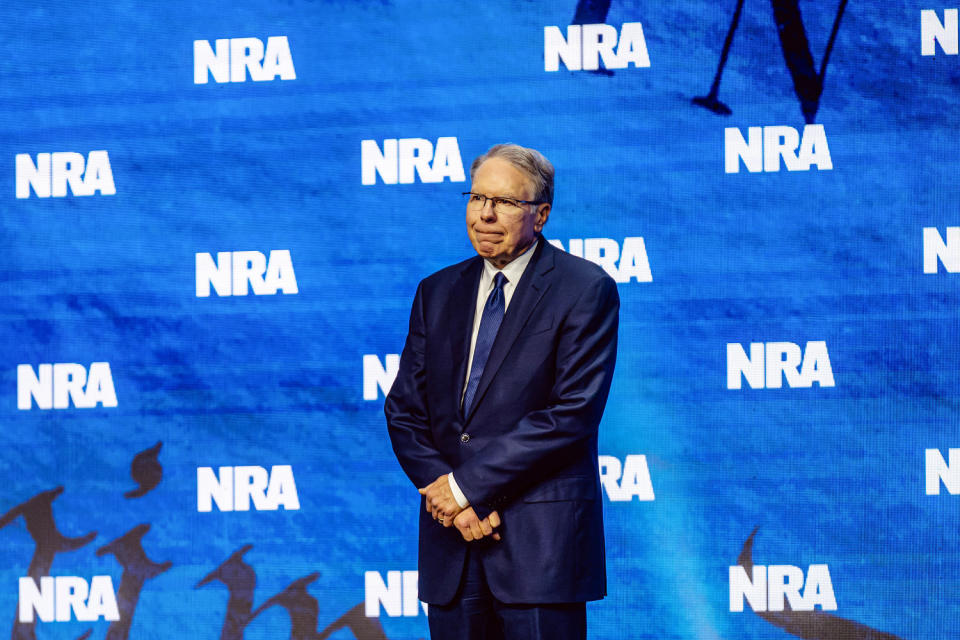NRA’s ex-CFO testified he charged group for his Texas to Virginia commute for 3 years
- Oops!Something went wrong.Please try again later.
- Oops!Something went wrong.Please try again later.
Wilson “Woody” Phillips, the first defendant to be called to the stand in the civil trial against the National Rifle Association and its executives, testified Friday that he billed the NRA for his interstate commute after he bought a new home in Texas and that he received $30,000 a month in compensation after he left the group.
Phillips spent 25 years overseeing the gun rights group’s finances as its treasurer and chief financial officer from 1993 to 2018.
He is fending off a lawsuit brought by New York Attorney General Letitia James in 2020 that alleges the NRA and two other current and former executives violated nonprofit laws and misused millions of dollars of the organization’s charitable assets for personal use.
Longtime NRA leader Wayne LaPierre and John Frazer, the group’s corporate secretary and general counsel, are also defendants.

Phillips, 75, lived in Virginia, where the NRA is headquartered, until 2015 when he bought property in Dallas and began spending about 60% of his time there. He testified that the NRA reimbursed him for that commute and for hotels for three years and that he did not tell the group’s compensation committee about those expenses.
As part of his compensation contract with the NRA, Phillips said he received $30,000 a month for at least five months after he retired from the group.
In her line of questioning just before proceedings ended early Friday afternoon, an attorney with the AG’s office was questioning Phillips about contracts awarded to a former girlfriend that he was not disclosing.
LaPierre is accused of diverting millions of dollars away from the NRA to spend on “lavish perks” for himself, including personal use of private jets, expensive meals, travel consultants, private security and trips to the Bahamas for him and his family.
The other defendants allegedly “went along with this,” Monica Connell, an attorney with the AG’s office, said during her opening arguments Monday.
Connell claimed Phillips violated numerous state laws and failed to take action against LaPierre, ultimately helping his boss maintain his power. She said LaPierre hired Phillips without a vetting process, despite Phillips having no prior experience as CFO or treasurer.
Phillips testified that he did not have LaPierre’s contract extension agreement approved by the NRA’s audit committee and that he did not do a separate assessment of it. The agreement stipulated that LaPierre would be paid $1.3 million for 2019 and even more in the following years.
In his opening arguments, Phillips’ attorney, Seth Farber, told the jury he would prove that his client never used his position to “line his own pocket” or conceal information from the NRA’s board of directors.
Farber said Phillips did not do his job perfectly, but that he “never intentionally did anything to harm the NRA.”
Phillips was on the stand for a little over an hour Friday. His testimony will continue next week.
His remarks concluded the first week of the trial, which is expected to last for more than a month.
The plaintiffs have also called former NRA board members Roscoe “Rocky” Marshall and Esther Schneider; nonprofit expert Jeffrey Tenenbaum; Michael Erstling, the NRA's director of budget and financial analysis; and Rick Tedrick, who works with the NRA’s financial services division. Tedrick testified by audio deposition.
The 12-member Manhattan jury is expected to hear from roughly 120 witnesses. Six of the jurors will be chosen to deliberate, while the others will serve as alternates.
If the deliberating jurors find the individual defendants liable, they will recommend the amount of money that each defendant would have to repay the NRA.
They would have also been tasked with recommending whether LaPierre should be ousted from the helm of the group, but LaPierre’s notice of resignation, on the eve of the trial, has rendered that moot. The 74-year-old has led the NRA for more than 30 years.
The jurors are still tasked with recommending whether Frazer should be removed from his position.
In a potential second phase of the trial, New York Supreme Court Judge Joel Cohen, who has the final say over monetary damages and remedies, could determine whether the defendants should be permanently barred from serving on the board of any charity in New York and whether an independent monitor should oversee the NRA’s finances.
None of the defendants have been criminally charged as part of James’ lawsuit.
The trial begins after years of failed attempts by the defendants to dismiss the lawsuit, change the court venue and countersue. The NRA also filed for Chapter 11 bankruptcy.
James initially set out to dissolve the NRA as part of her suit. However, Cohen dismissed that effort in 2022, saying her complaint “does not allege the type of public harm that is the legal linchpin for imposing the ‘corporate death penalty.’”
The lawsuit also targets the NRA as a whole. The organization has operated as a nonprofit charitable corporation in New York since 1871. Its assets are required by law to be used in a way that serves the interests of its membership and advances its charitable mission.
In the last few years, the NRA has been considerably weaker, with less influence in the political sphere and fewer members. Membership fell to 4.2 million from almost 6 million five years ago, The New York Times reported. Membership dues dropped by $14 million from 2021 to 2022, according to an audit filed as part of the lawsuit.
This article was originally published on NBCNews.com

